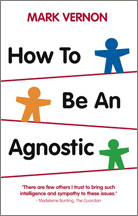This coming Sunday, March 6, at 1.30pm – BBC Radio 4 – In Doubt We Trust!
It’s become commonplace to observe that mental health is in decline in the west. What I didn’t expect to discover is that some of these malaises have to do with an intolerance of doubt, and a lust for certainty, that seems strikingly modern.
I was researching this radio series, In Doubt We Trust, and my new book, How To Be An Agnostic. Dr Iain McGilchrist, a psychiatrist and author, told me that a number of conditions can be linked to a fear of uncertainty. The obvious case is Obsessive Compulsive Disorder, often described as a ‘disease of doubt’. Sufferers experience intrusive and debilitating thoughts about cleanliness or safety because they are unable to distinguish between what has happened, what may happen and what won’t happen.
Or there are the pathological delusions some people suffer – in a way, the opposite of OCD: rather than doubting everything, they are incapable of doubting anything. Hence, a sufferer may be convinced that everyone on the bus is out to get them.
Professor Philippa Garety told me that there’s no point in attempting to counter the delusion directly. That only feeds the certainty with which the belief is held. Rather, the aim is gently, patiently, to encourage the individual to recognise that there are other ways of looking at the world. When they can countenance alternatives, individuals may also be able to doubt their own views.
Whether or not these conditions are symptomatic of modernity is hard to say for sure. However, it is the case that we are often encouraged to view life as a zero-sum game: I win only if you lose. Such a milieu doesn’t make us all pathologically delusional, though, as the old poster had it, ‘Just because you don’t know, doesn’t mean they’re not out to get you’!
Dr McGilchrist believes you can see something of what’s going on by understanding something about the brain. The two hemispheres of the brain see the world in very different ways. The left hemisphere is very good at focusing on particulars, and that’s necessary when you want to turn on the stove or tightening a screw. However, we also need a broader take on the world, so that we can embrace the unexpected and doubt what a narrower ‘left’ view believes. To put it another way, an individual can get out of balance – and again, ours is a culture that prefers the tangible and particular, what with the endless demands for conclusive evidence or absolute security where it just isn’t to be had.
All in all, life might be better if we were better able to tolerate doubt, even embrace it. That makes sense at a more philosophical level too. Socrates thought that one difference between us humans and other animals is that we are not just ignorant about many things, but we can become aware of that ignorance too: ‘unknown unknowns’ can become ‘known unknowns’.
There will always be matters beyond our ken. Hence, questions are often best answered by forging better questions. That can be frightening – but you must take those steps into the unknown, if you want to live and flourish.

